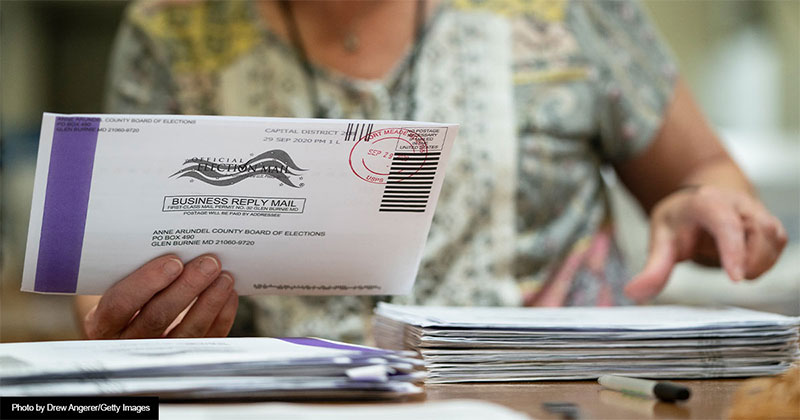
On Tuesday, Rasmussen Reports and The Heartland Institute released the results of a new poll indicating that one in five voters who submitted a mail-in ballot during the 2020 election admit to committing fraudulent activity in violation of federal law, including filling out a ballot for a friend or family member and submitting a ballot for a state they no longer live in. The results are unnerving election integrity experts and casting further doubt on the veracity of the 2020 election results, in which numerous irregularities were uncovered.
The survey polled 1,085 likely voters, of which 33% were Republican, 36% were Democrat, and 31% were “other.” The report found that “21% of mail-in voters admitted that they filled out a ballot for a friend or family member,” which is illegal in all 50 states. In addition, “17% of mail-in voters said they signed a ballot for a friend or family member ‘with or without his or her permission.’”
Other findings revealed that “17% of mail-in voters … voted in a state where they are ‘no longer a permanent resident,’” in violation of federal election law. Another 8% of respondents said that “they were offered ‘pay’ or a ‘reward’ for voting in 2020.” The survey also found that “10% of all respondents — not just those who said they voted by mail — claimed that they know ‘a friend, family member, co-worker, or other acquaintance who has admitted … that he or she cast a mail-in ballot in 2020 in a state other than his or her state of permanent residence.’”
In the 2020 election, 43% of voters cast their ballots by mail, the highest percentage in American history. This means that over 66 million mail-in ballots were cast, out of a total of 155 million ballots. When that number is compared to the slim margin of victory in which then-candidate Joe Biden declared victory over President Donald Trump in at least three swing states (Arizona by 10,400 votes, Georgia by 11,779 votes, and Wisconsin by 20,682 votes), the Rasmussen/Heartland poll results are proving to be especially alarming to election integrity experts.
“The results of this survey are nothing short of stunning,” stated Justin Haskins, director of the Socialism Research Center at The Heartland Institute. “For the past three years, Americans have repeatedly been told that the 2020 election was the most secure in history. But if this poll’s findings are reflective of reality, the exact opposite is true. This conclusion isn’t based on conspiracy theories or suspect evidence, but rather from the responses made directly by the voters themselves.”
Matt Carpenter, director of FRC Action, voiced additional concerns about the problems that are inherent with mail-in ballots.
“If the results of this study are anywhere close to the truth, then the opponents of mass mail-in voting were justified in their criticism ahead of the 2020 election,” he told The Washington Stand. “Many states have long held that absentee ballots should be made available to voters if they are unable to make it to the polls in person on election day, or more recently during an early voting period, due to an excused absence, like a health issue or work commitment that prevents them from traveling. It is when you loosen these restrictions and allow ballots to be sent via mail for any reason whatsoever, that you increase the likelihood of fraud.”
Carpenter continued, “Chain of custody is an important principle in election administration because it provides certainty that the voter’s preferences are actually reflected on the ballot itself. State policymakers and election officials would be wise to not repeat the mistakes of 2020 by allowing universal mail-in voting.”
Ken Blackwell, a board member of the International Foundation for Electoral Systems and FRC Action’s special advisor for Election Integrity, echoed Carpenter’s contentions.
“Because of COVID, there was a loosening of the chain of custody and relaxation of the verification systems for mail-in ballots,” he told TWS. “Too many hands touched too many ballots.”
Blackwell went on to express confidence that the 2024 election will be significantly more secure than in 2020. “There are a number of us in the election integrity movement adding more transparency to the process and more people to be poll watchers,” he explained. “Some folks are fearing about a revisitation of what happened during COVID, but voters aren’t going to go for it.”
















